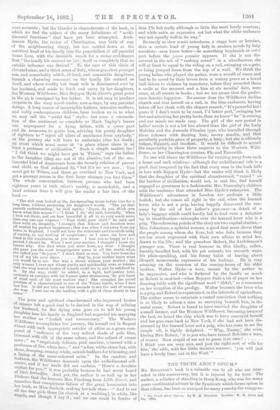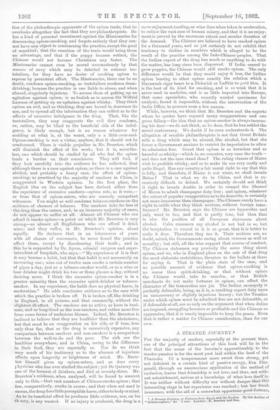THE TRUTH ABOUT OPIUM.* MR. Reeitiefols's book is a valuable
one to all who are inter- ested in this controversy, but it is injured by its tone. The author, a solicitor of standing in Hong Kong, who was for many years confidential adviser to the Syndicate which farms opium in that colony, has been so annoyed formany years by the exaggera-
* Thu Truth about Opium. By W. H. Brenton. London; W. H, Allen and 0o. 1:c2. tion of the philanthropic opponents of the opium trade, that he overlooks altogether the fact that they are philanthropists. He has a kind of personal resentment against the Missionaries for denouncing opium-smoking, and forgets entirely that they can- not have any object in condemning the practice, except the good of mankind; that the cessation of the trade would bring them no advantage, and that if the poppy became extinct, the Chinese would not become Christians any faster. The Missionaries cannot even be moved unconsciously by that nuance of envy which may be detected in extreme tee- totallers, for they have no desire of smoking opium to repress by persistent effort. The Missionaries, there can be no doubt, condemn opium-smoking, as teetotallers condemn dram- drinking, because the practice is one liable to abuse, and when abused, singularly injurious. To accuse them of getting up an agitation against opium, is as foolish as to accuse Sir Wilfrid Lawson of getting up an agitation against whisky. They think opium an evil, and so thinking, they are bound to denounce its use, and to spread all the information they can collect as to the effects of excessive indulgence in the drug. That, like the teetotallers, they may exaggerate the evil they condemn, or, rather, may be blind to the beneficial side of the indul- gence, is likely enough, but is no reason whatever for scolding at what is, at the worst, only a a little over-zeal. Opium-smoking is not a virtue, anyhow, that it should not be condemned. There is visible prejudice iu Mr. Brereton, which will diminish the effect of his work ; but it is, neverthe- less, one which should be studied by all who feel the opium trade a burden on their consciences. They will find, if they look carefully into the evidence he has collected, that although there is a case against opium, as there is a case against alcohol, and probably a heavy case, the effect of opium- smoking, as practised by the majority of smokers in China, is exaggerated in Western opinion. In the first place, the English idea on the subject has been derived either from the experience of excessive smokers—opium sots, as it were,— or from that of opium-eaters, who are scarcely competent witnesses. You might as well condemn tobacco-smokers on the evidence of chewers of tobacco. The smokers take far less of the drug than the eaters, and, in an immense majority of cases, do not appear to suffer at all. Almost all Chinese who can afford it smoke opium—a point on which Mr. Brereton is very strong—as almost all Englishmen who can afford it drink wine ; and they suffer, in Mr. Brereton's opinion, about
equally. He declares that in an intercourse of years with all classes of consumers, he never found the practice affect them, except by discolouring their teeth ; and in this he is supported by Dr. Ayres, colonial surgeon and super- intendent of hospitals, who says,—" My experience of it is that it may become a habit, but that that habit is not necessarily an increasing one ; nine out of twelve men smoke a certain number of pipes a day, just as a tobacco smoker would, or as a wine or beer drinker might drink his two or three glasses a day, without desiring more. I think the excessive opium-smoker is in a greater minority than the excessive spirit-drinker or tobacco- smoker. In my experience, the habit does no physical harm, in moderation." He adds conclusive evidence as to the ease with which the practice is broken off. It is broken off, like drinking in England, in all prisons, and that summarily, without the slightest ill-effect. The smokers are as active, as keen in busi- ness, and as long-lived as the non-smokers, and rather more free from some forms of malarious disease. Indeed, Mr. Brereton is inclined to believe that they are healthier than the abstainers ; but that must be an exaggeration on his side, or if true, true only thus far, that as the drug is excessively expensive, any comparison between smokers and non-smokers is a comparison between the well-to-do and the poor. The rich are the healthier everywhere, and in China, owing to the difference in their food, they are especially so. Nor do we think very much of his testimony as to the absence of injurious effects upon longevity or brightness of mind. Mr. Brere- ton himself gives up opium-eaters, and so does every physician who has ever studied the subject ; yet De Quincey was one of the keenest of thinkers, and died at seventy-three. Mr. Brereton's evidence, when analysed, will be found to amount only to this,—that vast numbers of Chinese smoke opium ; that few, comparatively, smoke in excess ; and that when not used in excess, the drug does little perceptible harm, either to body or mind. As to its beneficial effect he produces little evidence, nor, on his th eory, is any wanted. If no injury is produced, the drug is a
mere enjoyment, tending, as wine does when taken in moderation, to reduce the vast sum of human misery, and that it is an enjoy- ment is proved by the enormous extent and secular duration of the demand. The Chinese are believed to have smoked opium for a thousand years, and as yet certainly do not exhibit that tendency to decline in numbers which is alleged to be the result of the practice among the Indo-Chinese peoples. That the Indian export of the drug has much or anything to do with the matter, has long since been disproved. If India ceased to grow poppies, the Chinese would still smoke opium. The only difference would be that they would enjoy it less, the Indian opium bearing to other opium exactly the relation which a Havannah cigar bears to a Pickwick or Laffitte to petit blew. It is the best of its kind for smoking, and is so weak that it is never used in medicine, and is so little imported into Europe, that some specialists, who recently wanted specimens for analysis, found it impossible, without the intervention of the India Office, to procure even a few ounces.
While, however, we think that Mr. Brereton and the experts whom he quotes have exposed many exaggerations and one gross fallacy—the idea that an opium-smoker is always increas- ing his dose—we do not think, as he does, that he has settled the moral controversy. We doubt if he even understands it. The allegation of sensible philanthropists is not that Great Britain sells a drug which may be abused, like alcohol, but that she forces a Government anxious to restrict its importation to allow its admission free. Grant that opium is as harmless and as harmful as whisky—which is, we conceive, very near the truth— and does not the case stand thus P The ruling classes of Maine wish to prohibit whisky, and so to make its use very costly and quite illegal. Has any country a fair moral right to say that this is folly, and therefore, if Maine is not wiser, we shall invade Maine P That is what we do in China, and that is ex- cessively difficult to defend. We certainly should not think it right to invade Arabia in order to compel the Shereef of Mecca to admit champagne duty free ; and opium, whatever the extent of popular exaggeration as to its demerits, is certainly not more innocuous than champagne. The Chinese surely have a right to settle what they think noxious, without foreign inter- ference ? Mr. Brereton says the Chinese are hypocrites and only want to tax, and that is partly true, but then that is also the position of all European statesmen about alcohol. Calm reasoners say alcohol is not bad in se, but the temptation to exceed in it is so great, that it is better to make it dear. Therefore they tax it. Their motives are, no doubt, mixed, the Governments caring about revenue as well as morality ; but still, all the wise support that course of conduct. The Chinese statesmen say precisely the same thing about opium, and we, who in England place on the sale of that drug the most elaborate restrictions, threaten to fire bullets at them for saying it. That is the plain state of the case, and uo possible amount of evidence that opium-smoking is uo worse than spirit-drinking, or that without opium the Chinese would , take to samshu, or that British merchants do not make fortunes in opium, can affect the character of the transaction one jot. The Indian monopoly is perfectly defensible, being, as it is, a crushing export duty upon an unnecessary or slightly injurious luxury ; but the Treaties under which opium must be admitted free are not defensible, or if defensible at all, are so only on the argument that when duties are imposed, smuggling becomes so profitable and the Chinese so oppressive, that it is nearly impossible to keep the peace. Even that is rather a matter for Chinese consideration, than for our own.































 Previous page
Previous page